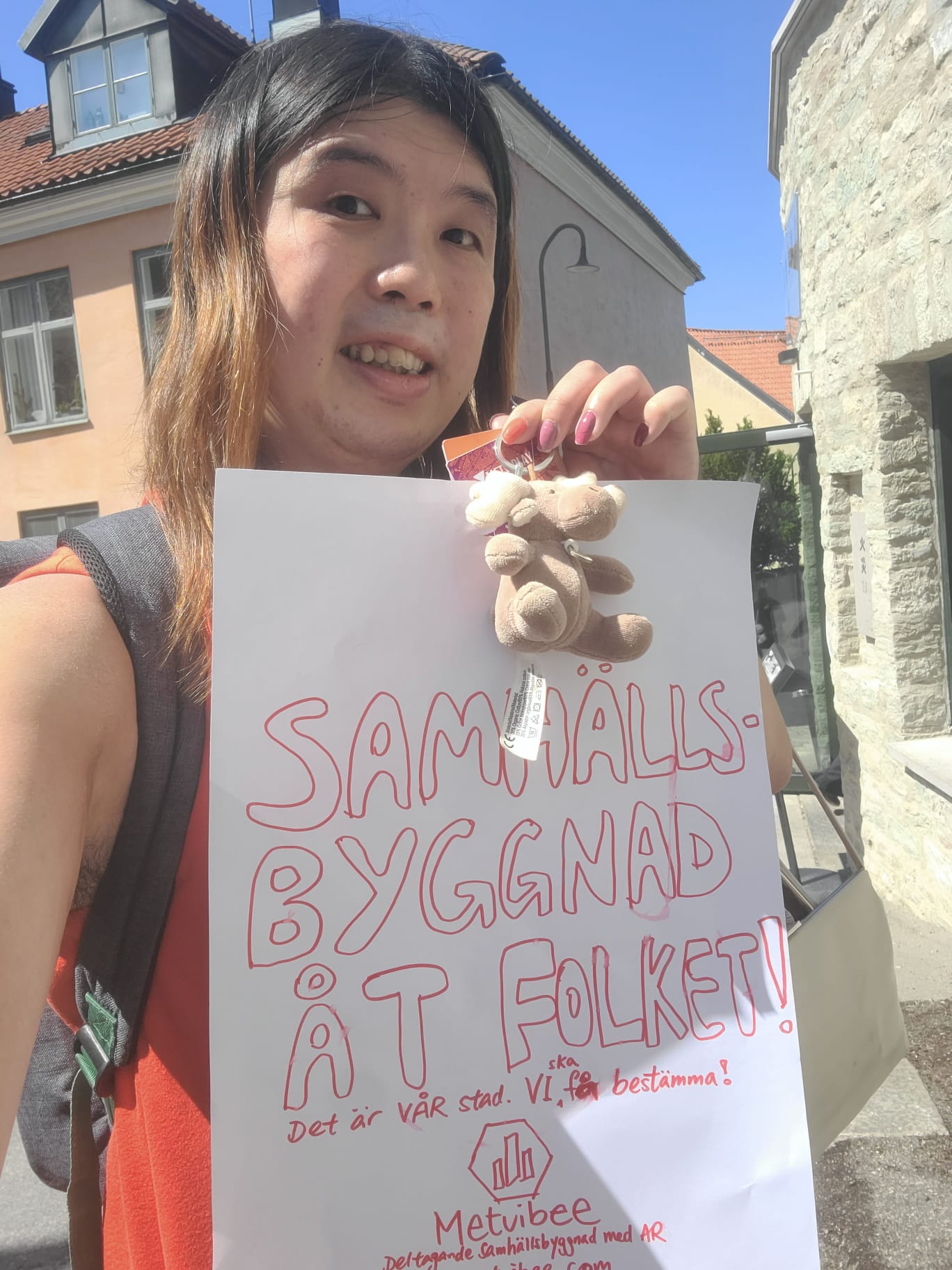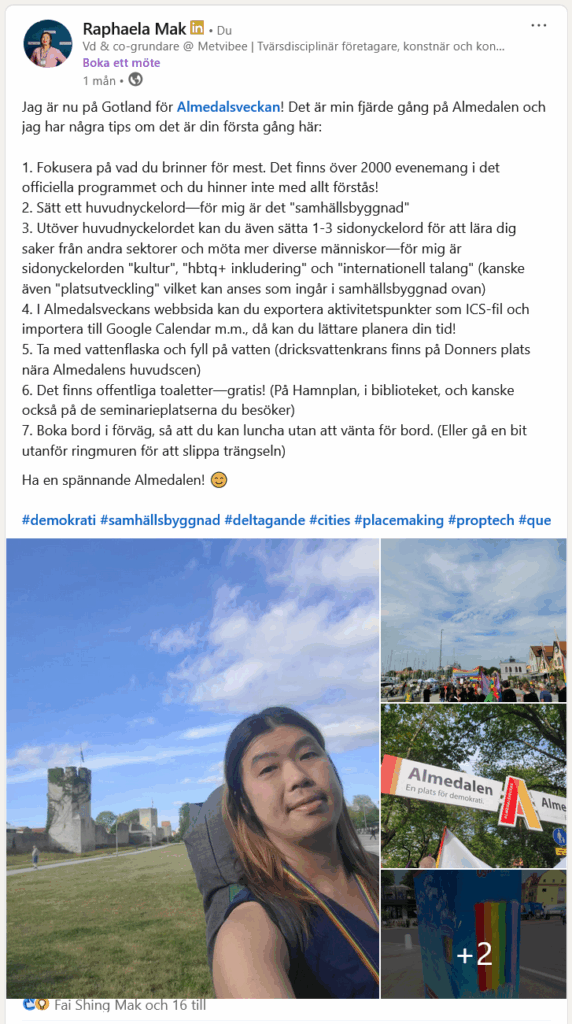Almedalsveckan (Almedalen) is an annual democracy festival in Visby on the Swedish island of Gotland. Originating from Prime Minister Olof Palme’s annual impromptu speech since 1968, it’s now become the largest democracy festival in the world, attracting up to 40000 visitors from all around Sweden and even from overseas.
Centered around speeches by the leaders of each of the parties represented in parliament, the event has grown with thousands of activities organized by non-profits, political parties, and companies from all over the country.
Almedalen as a participatory political platform: what are the challenges?
Almedalen is now a known case study for participatory democracy internationally, but it comes with some challenges:
- High cost of accommodation, pricing out many stakeholders from participating, especially young people not affiliated to an organization.
- Monotonous content—most activities are seminars where only a few people talk and everyone else listen passively. Q&A sessions are often skipped altogether.
- Exclusivity of political discussions—while there are many public events, there are more private events where discussions take place and where normal people don’t have access to
- Highly commercialized—while public events on the calendar must be free, many are sponsored by large companies or industry organizations with large budgets for venues and marketing, effectively dominating attention
- Lack of English-speaking content, shutting out immigrants and expatriates from the discussion
- Too fast-paced and overwhelmed with people, making it hard to have meaningful communication and also challenging for neurodivergent people to participate
- Domination of Stockholmers at Almedalen (due to the national power structure in politics)—Almedalen is nicknamed “Stockholmsveckan” (Stockholm Week)
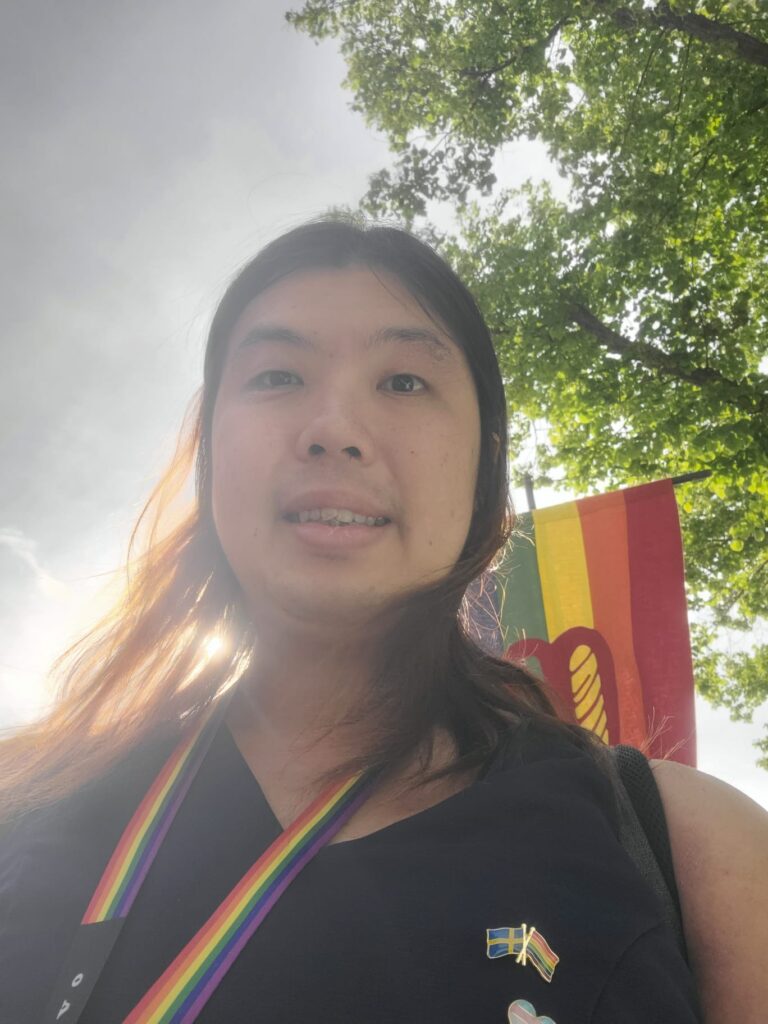
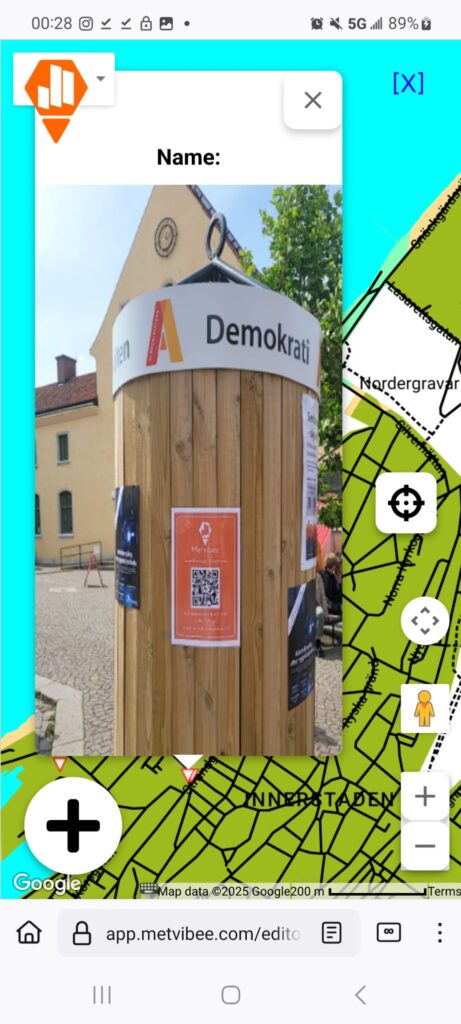
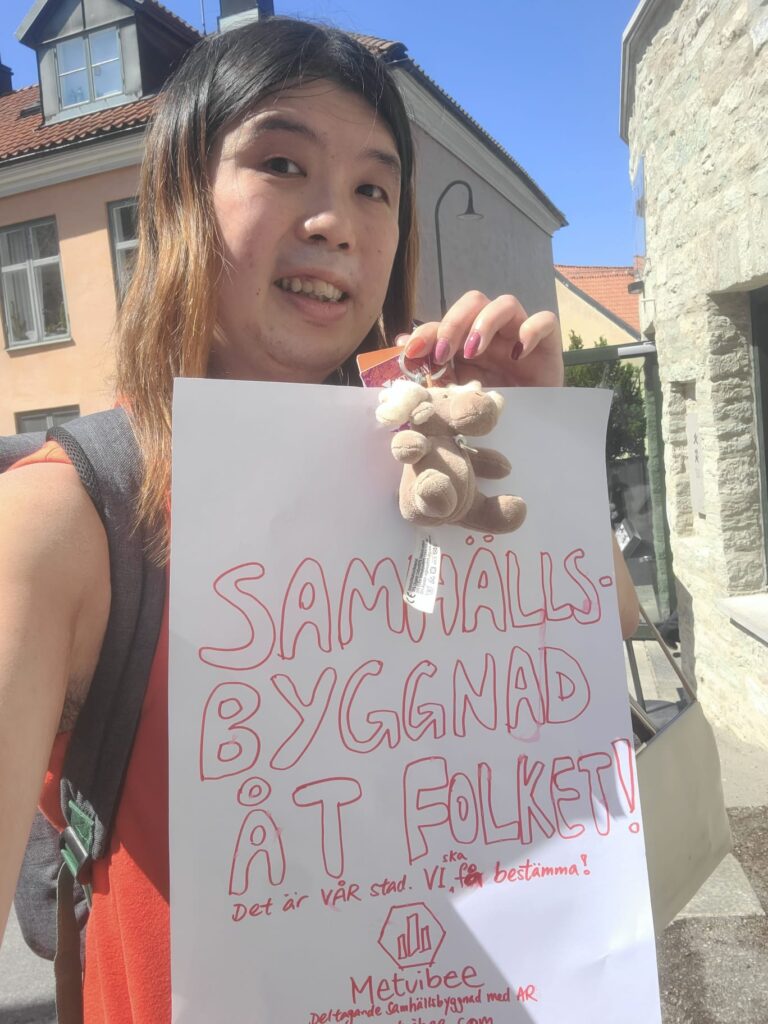
Sticker polls
To explore more about the challenges I mentioned above, I created several sticker polls on Donners plats, a very central location in Visby where many people pass by. Sticker polls are a common technique to quickly poll passers-by on certain simple questions.
I asked the following questions:
- Sheet 1: Do you want more of these at Almedalen next year? (Options: seminars, hands-on workshops, pecha kucha, themed meetups/matchmaking/open mingel, open stage/debate which anyone can join, art/exhibition, open focus group discussions, others)
- Sheet 2: How do you feel today? (Options: happy, fun, sad, angry, surprised, others)
- Sheet 3: (1) Have you succeeded in doing what you planned to do this year? (scale from not at all to I did everything) / (2) Do you think the tempo at Almedalen suits you well? (scale from too slow to too fast)



Here I made a mistake: I didn’t realize the pens I used were water-based! It rained on the night before I left Gotland and the ink was washed out on two out of the three sheets (the first sheet was only slightly affected probably due to the wind direction). The final results were as follows:



- Sheet 1 (activities you want to have more at Almedalen):
- Seminars – 1 vote
- Workshops – 2 votes
- Pecha kucha – 0 votes
- Themed meetups – 5 votes
- Open stage/debate – 8 votes
- Art/exhibition – 13 votes
- Open focus groups – 0 votes
- Others – 3 votes
- Sheet 2 (How do you feel today):
- Happy – 5 votes
- Fun – 0 votes
- Sad – 0 votes
- Angry – 2 votes
- Surprised – 1 vote
- Others – 0 votes
- Sheet 3:
- (1) Have you succeeded in doing what you planned to do this year? (scale from not at all to I did everything)
- 4 people voted, ranging from “slightly under half” to “having done most things planned”, the average leans towards just right (did more) of the middle point
- (2) Do you think the tempo at Almedalen suits you well? (scale from too slow to too fast)
- 3 people voted, ranging from “just right” to “too fast”, the average is approximately at the 75%-80% mark
- (1) Have you succeeded in doing what you planned to do this year? (scale from not at all to I did everything)
Takeaways
This participation exercise asked only four questions, but it revealed important insights:
- People want things out of the ordinary—they don’t just want seminars, they want experiences where they can connect, participate, and be awed
- Art/Exhibition being the most preferred option, followed by open stage/debate
- Is Almedalen a facade for “progress politics” in Sweden? There is so much content for celebrating achievements and discussing challenges, but what about the people’s emotions?
- Most people chose “happy”, but not everyone is happy—people are allowed to be angry too (anonymous participation methods can help people express unpopular opinions)
- Yes, Almedalen is too fast-paced—you’re allowed to admit it!
- How can we create space for people to take a rest? How can we slow Almedalen down so that people can have more meaningful connections?
Going forward—how can we make Almedalen more inclusive and meaningful for everyone?
This exercise continues with planning for Almedalen 2026, here are some possibilities I’m thinking about:
- Lead discussions on overarching themes with participatory exercises (e.g. workshops): how can we imagine Sweden’s future together? How do you want Sweden to look like?
- More participatory activities in public space: sticker voting, open stage, a lounge for people to chill…
- Encourage more English activities at Almedalen (connect with prospective organizers?)
- Tools to help participants plan their activities wisely, with break times and information on spots to chill
Do you have more ideas? Click on the map below to add your ideas!
The widget below is powered by Metvibee, my participatory urban design startup
Let’s get in touch to help you with planning and implementing participatory processes!
I love participatory processes! Many of my projects are structured as, or involve, participatory processes, such as my Modular Music and Pattern Language Workshop and Lappis Screams installation.
Incorporating participatory processes into your business and work can help you understand the relevant people and information more deeply and correctly, and explore different perspectives you might have otherwise missed. For example, you might not have discovered your customers use your products in a way you’ve never thought of; you can use this valuable information when developing your product and marketing, and even change directions to boost your business.
In some cases, participatory processes can be critical in avoiding costly or dangerous mistakes, such as highways that cut off residents’ paths to work and school, or people with disabilities falling off a flight of unexpected stairs.
Let me help you get started with participatory processes in your work! Book a meeting with me so we can sort it out.
